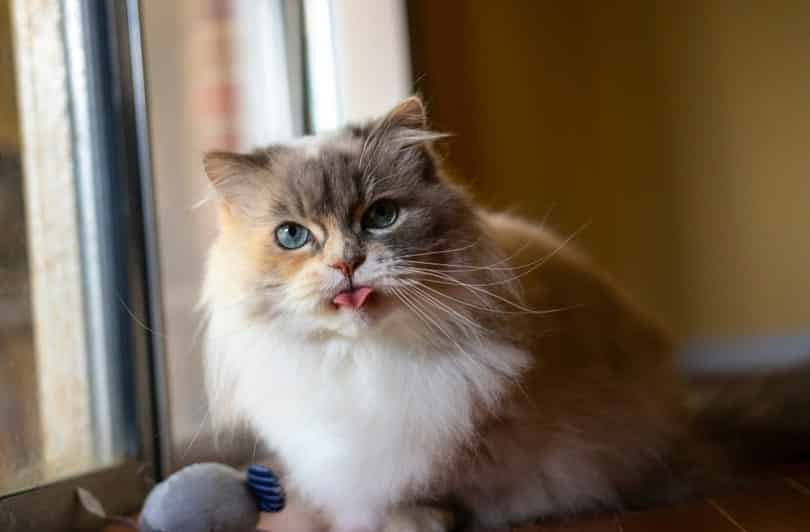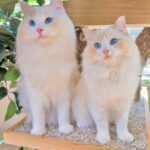The Napoleon Cat, also known as the Minuet, is a relatively new and captivating breed that has quickly won hearts with its adorable appearance and affectionate nature. Recognizable for their short legs, a trait inherited from their Munchkin lineage, Napoleon cats are far from being hindered by their stature. Instead, they are agile, playful, and full of charm, making them wonderful companions for individuals and families alike.
Breed Overview: Napoleon Cat at a Glance
| Feature | Description |
|---|---|
| Height | 7–8 inches |
| Weight | 5–9 pounds |
| Lifespan | 9–15 years |
| Colors | Chocolate, sepia, mink, white, lilac, and combinations |
| Coat Length | Shorthair and Longhair varieties available |
| Temperament | Affectionate, adaptable, playful, intelligent |
| Suitable for | Families, singles, seniors, multi-pet households |
Originally bred in 1996 by Joe Smith, the Napoleon cat is the delightful result of crossing Munchkin and Persian breeds. The aim was to create a cat that combined the endearing short legs of the Munchkin with the beauty and gentle temperament of the Persian. The result is a breed that is both visually stunning and exceptionally sweet-natured. The Persian influence contributes to their luxurious coats and calm demeanor, while the Munchkin genes bring a playful energy and unique physical characteristic. This blend creates a balanced cat that is adaptable to various lifestyles.
Napoleon Cat Characteristics: Understanding the Breed’s Traits
To better understand if a Napoleon cat is the right fit for you, it’s important to consider their key characteristics:
Energy Level: Adaptable and Playful
Napoleon cats exhibit a moderate energy level. Unlike extremely high-energy breeds that demand constant activity, or low-energy cats that are predominantly sedentary, Napoleon cats are wonderfully adaptable. They can be playful and active when the mood strikes, enjoying games and interactive play, but they are also content to relax and cuddle. This adaptability makes them suitable for both active households and quieter homes. They appreciate playtime but won’t become destructive or overly demanding if their owners have less time for games on certain days.
Trainability: Surprisingly Intelligent and Eager to Please
While cats are not always known for their trainability in the same way as dogs, Napoleon cats stand out for their intelligence and eagerness to connect with their owners. This breed is often described as “puppy-like” in their devotion and willingness to learn. They can be trained to perform simple commands, such as fetching toys or sitting, and some owners have even successfully leash-trained their Napoleon cats for outdoor adventures. Their intelligence also means they benefit from mental stimulation through puzzle toys and interactive games to prevent boredom.
Health: Generally Healthy with Breed-Specific Considerations
Napoleon cats are generally considered a healthy breed, but like all breeds, they can be predisposed to certain health conditions inherited from their parent breeds. Understanding these potential health issues is crucial for responsible ownership. It’s important to choose a reputable breeder who screens their cats for genetic health problems.
Lifespan: A Good Long-Term Companion
With a lifespan of 9 to 15 years, Napoleon cats offer a significant period of companionship. Factors influencing their lifespan include genetics, diet, exercise, and overall care. Providing a high-quality diet, regular veterinary check-ups, and a stimulating and loving environment will contribute to a long and healthy life for your Napoleon cat.
Sociability: Affectionate and Family-Oriented
Sociability is a hallmark of the Napoleon cat breed. They are known for forming strong bonds with their families and thrive on companionship. They are typically welcoming of strangers and get along well with children, making them excellent family pets. Their affectionate nature extends to other animals in the household as well. Napoleon cats often coexist peacefully and even form close bonds with other cats and dogs, making them ideal for multi-pet homes.
Napoleon Cat Kittens: Irresistibly Cute Beginnings
Napoleon kittens are undeniably adorable, inheriting the charming short legs and soft features of the breed. Raising a Napoleon kitten is a joyous experience. They are playful, curious, and eager to explore their surroundings. Early socialization is crucial for Napoleon kittens to ensure they grow into well-adjusted and confident adult cats. Exposing them to various sights, sounds, people, and gentle handling will help them develop into friendly and sociable companions.
Temperament and Intelligence of the Napoleon Cat: A Winning Combination
The Napoleon cat’s temperament is one of its most appealing qualities. They are known for being incredibly affectionate, gentle, and people-oriented. Their intuitive nature allows them to connect deeply with their owners, often sensing moods and offering comfort. This breed thrives on interaction and companionship, making them ideal lap cats and devoted family members.
Their intelligence further enhances their appeal. Napoleon cats are quick learners and enjoy engaging in interactive play and even training. This combination of intelligence and affection makes them a delightful breed to live with, offering both entertainment and loving companionship.
Are Napoleon Cats Good for Families? Absolutely!
Napoleon cats are exceptionally well-suited for family life. Their laid-back and adaptable nature makes them wonderful companions for children of all ages. They are tolerant and patient, making them less likely to be easily startled or become aggressive, even with young children. Their playful nature ensures they can engage in fun activities with kids, while their moderate energy level means they won’t overwhelm a busy household. Their smaller size also makes them well-suited for indoor living, including apartments.
Do Napoleon Cats Get Along with Other Pets? Yes, They Typically Do!
The friendly and sociable temperament of the Napoleon cat extends to other pets. They are generally accepting of other cats and dogs, and their gentle nature minimizes the likelihood of conflicts. In fact, Napoleon cats often enjoy the company of other animals and can thrive in multi-pet households. Their desire for companionship means they may even prefer having another furry friend around, especially if their owners are away from home for extended periods.
Things to Know When Owning a Napoleon Cat: Essential Care Tips
Owning a Napoleon cat is a rewarding experience, but like any pet, it requires understanding their specific needs.
Food and Diet Requirements: Balanced Nutrition for a Healthy Cat
Like all domestic cats, Napoleon cats thrive on a balanced diet consisting of high-quality cat food. This can include dry kibble, wet canned food, or a combination of both. Raw food diets are also an option, but should be carefully researched and potentially discussed with a veterinarian to ensure they meet all nutritional requirements. Always provide fresh, clean water for your Napoleon cat. While cats may enjoy the taste of milk, it is not a necessary part of their diet and can cause digestive upset in lactose-intolerant cats.
Exercise: Maintaining Physical and Mental Well-being
While not overly demanding in terms of exercise, Napoleon cats still benefit from daily activity to maintain their physical and mental well-being. Interactive play sessions using feather wands, laser pointers, or puzzle toys are excellent ways to provide exercise and mental stimulation. Providing scratching posts and climbing structures also encourages natural feline behaviors and helps keep them active indoors. Even short-legged Napoleon cats are surprisingly agile and enjoy opportunities to play and explore.
Training: Harnessing Their Intelligence
Napoleon cats are intelligent and trainable, making it possible to teach them various commands and tricks. Positive reinforcement methods, such as treats and praise, work best when training cats. Basic commands like “sit,” “stay,” and “come” can be taught with patience and consistency. Leash training is also possible for Napoleon cats, allowing them to safely enjoy supervised outdoor time.
Grooming: Managing Their Luxurious Coat
Grooming needs for Napoleon cats vary depending on whether they are longhaired or shorthaired. Both varieties have dense, plush coats that require regular brushing to prevent matting and minimize shedding. Longhaired Napoleon cats will require more frequent and thorough brushing than shorthaired varieties. Regular grooming sessions also provide an opportunity to bond with your cat and check for any skin issues or parasites.
 beautiful blue eyed Napoleon Minuet
beautiful blue eyed Napoleon Minuet
Health Conditions: Awareness and Preventative Care
While generally healthy, Napoleon cats can be prone to certain hereditary conditions:
Minor Conditions:
- Photophobia: Sensitivity to bright light, causing squinting or blinking.
- Cataracts: Clouding of the lens of the eye, potentially leading to blindness.
Serious Conditions:
- Polycystic Kidney Disease (PKD): Inherited from Persian lines, causing cysts on the kidneys and potentially kidney dysfunction.
- Lordosis: An inward curvature of the spine, inherited from Munchkin lines, potentially causing spinal pressure.
Regular veterinary check-ups are crucial for early detection and management of any health issues. Discussing the breed’s potential health concerns with a breeder and your veterinarian will help ensure your Napoleon cat receives the best possible care.
Male vs Female Napoleon Cats: Individual Personalities Prevail
When it comes to personality differences between male and female Napoleon cats, individual variations are far more significant than gender-specific traits. Each Napoleon cat, regardless of sex, has its own unique personality. While there might be slight tendencies, such as males being slightly larger, temperament is largely shaped by individual genetics, socialization, and environment rather than solely by gender. The decision between a male or female Napoleon cat should primarily be based on personal preference and the individual cat’s personality rather than expecting distinct gender-based behaviors.
3 Fascinating Facts About The Napoleon Cat: Beyond the Short Legs
The Napoleon cat is full of surprises, even beyond their distinctive short legs. Here are three lesser-known facts:
1. Short Legs, No Limits: Agile and Capable
Despite their short legs, Napoleon cats are surprisingly agile and capable. They can run, play, and navigate their environment with ease. While they may not be champion jumpers compared to some long-legged breeds, they can still reach elevated surfaces and are not limited by their stature. Their agility and playful nature dispel any misconceptions about them being less active or capable due to their short legs.
2. A Relatively Rare Breed: Exclusivity and Appeal
The Napoleon cat is still considered a relatively rare breed. This rarity contributes to their higher price point compared to more common cat breeds. Their unique combination of traits, beautiful appearance, and affectionate temperament makes them highly sought after by cat enthusiasts. The breed’s recent origin and the specific breeding process required to maintain their distinctive characteristics contribute to their exclusivity.
3. Initially Met with Skepticism: Overcoming Breed Recognition Challenges
When first introduced, the Napoleon cat faced criticism and skepticism, primarily due to concerns surrounding the ethics of breeding cats with dwarfism. Despite initial resistance, the breed’s endearing qualities and devoted breeders eventually led to recognition by The International Cat Association (TICA). Initially registered as “Napoleon,” the breed name was later changed to “Minuet,” although both names are still used today. Their journey to breed recognition highlights the evolving understanding and acceptance of unique breeds within the cat fancy.
Final Thoughts: Is a Napoleon Cat Right for You?
The Napoleon cat is a truly exceptional breed that offers a delightful combination of charm, affection, and adaptability. If you are seeking a feline companion who is loving, playful, and relatively low-maintenance (in terms of energy demands), the Napoleon cat is an excellent choice. While they may be a bit pricier due to their rarity, the joy and companionship they bring are well worth the investment for many cat lovers. Their ability to thrive in various home environments, their affection for families and other pets, and their endearing personalities make Napoleon cats wonderful additions to loving homes. If you are looking for a cat that will be more than just a pet, but a true friend and family member, consider welcoming a Napoleon cat into your life.

